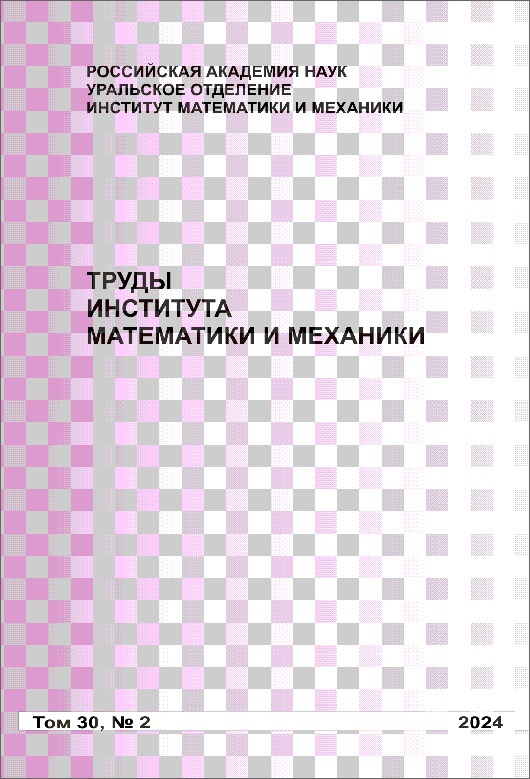|
This article is cited in 1 scientific paper (total in 1 paper)
On the equivalence of some inequalities in the theory of approximation of periodic functions in the spaces Lp(T),1<p<∞
N. A. Il'yasov
Baku State University
Abstract:
We propose a method for proving, in particular, the equivalence of M.F. Timan's known estimates for the rth-order Lp-moduli of smoothness ωr(f;π/n)p and O.V. Besov's estimates for the Lp-norms ‖f(r)‖p of rth-order derivatives by using elements of the sequence {En−1(f)p}∞n=1 of the best approximations of a 2π-periodic function f∈Lp(T) by trigonometric polynomials of order at most n−1, n∈N, where r∈N, 1<p<∞, and T=(−π,π]. Theorem 1. Let 1<p<∞, θ=min{2,p}, r∈N, f∈Lp(T), and ∑∞n=1nθr−1Eθn−1(f)p<∞. Then the inequality ωr(f;π/n)p⩽, n\in \mathbb N, is satisfied if and only if f\in L_{p}^{(r)}(\mathbb T) and \|f^{(r)}\|_{p} \le C_{2}(r,p) \Big(\sum_{n=1}^{\infty}n^{\theta r-1} E_{n-1}^{\theta}(f)_{p}\Big)^{1/\theta}, where L_{p}^{(r)}(\mathbb T) is the class of functions f\in L_{p}(\mathbb T) with absolutely continuous derivative of the (r-1)th order and f^{(r)} \in L_{p}(\mathbb T). Theorem 2. Suppose that 1 < p < \infty, \beta=\max\{2,p\}, r\in \mathbb N, and f\in L_{p}^{(r)}(\mathbb T). Then the inequality n^{-r}\Big(\sum_{\nu=1}^{n}\nu^{\beta r-1} E_{\nu-1}^{\beta}(f)_{p}\Big)^{1/\beta}\le C_{3}(r,p)\omega_{r}(f;\pi/n)_{p} is satisfied for n\in \mathbb N if and only if the inequality \Big(\sum_{n=1}^{\infty}n^{\beta r-1}E_{n-1}^{\beta}(f)_{p}\Big)^{1/\beta}\le C_{4}(r,p)\|f^{(r)}\|_{p} is satisfied. In view of the order identity \sum_{\nu=1}^{n}\nu^{\alpha r-1}E_{\nu-1}^{\alpha}(f)_{p}\asymp\sum_{\nu=1}^{n}\nu^{\alpha r-1} \omega_{l}^{\alpha}(f;\pi/\nu)_{p}, n\in\mathbb N\cup\{+\infty\}, where 1\le\alpha < \infty, l\in\mathbb N, and l>r, the assertions of Theorems 1 and 2 remain valid if we replace the sequence \{E_{n-1}(f)_{p}\}_{n=1}^{\infty} by the sequence \{\omega_{l}(f;\pi/n)_{p}\}_{n=1}^{\infty} (Theorems 3 and 4). The method used in the proof of Theorems 1 and 2 can be applied to derive equivalent upper estimates and equivalent lower estimates for the values E_{n-1}(f^{(r)})_{p} and \omega_{k}(f^{(r)};\pi/n)_{p}, n\in \mathbb N, by means of elements of the sequence \{E_{n-1}(f)_{p}\}_{n=1}^{\infty}, where k,r\in \mathbb N and 1 < p < \infty.
Keywords:
best approximation, modulus of smoothness, inequalities of approximation theory, equivalent inequalities, Timan's inequalities, Besov's inequalitie.
Received: 13.03.2018
Citation:
N. A. Il'yasov, “On the equivalence of some inequalities in the theory of approximation of periodic functions in the spaces L_p(\mathbb T),1 < p < \infty”, Trudy Inst. Mat. i Mekh. UrO RAN, 24, no. 2, 2018, 93–106
Linking options:
https://www.mathnet.ru/eng/timm1526 https://www.mathnet.ru/eng/timm/v24/i2/p93
|

| Statistics & downloads: |
| Abstract page: | 436 | | Full-text PDF : | 161 | | References: | 97 | | First page: | 34 |
|




 Contact us:
Contact us: Terms of Use
Terms of Use
 Registration to the website
Registration to the website Logotypes
Logotypes









 Citation in format
Citation in format 